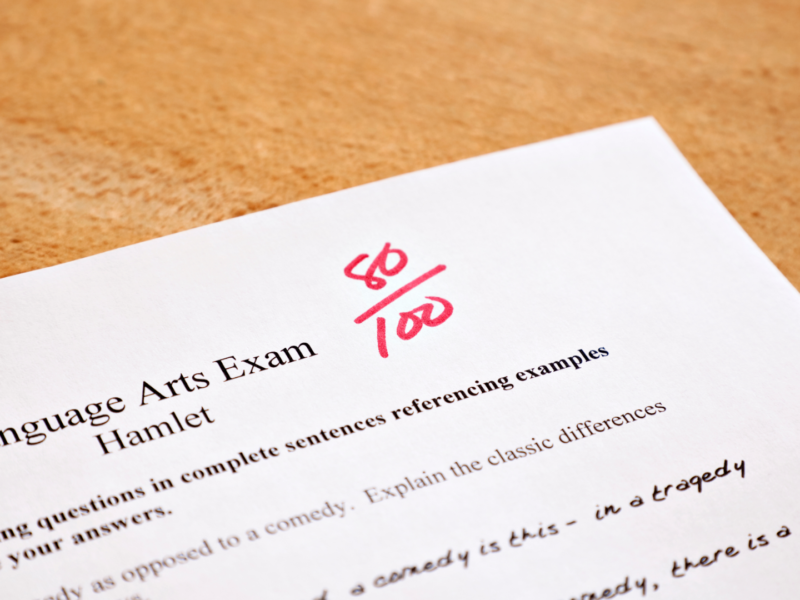Cerebrate Blog.
Explore strategies for skill development

The Link Between Self-Assessment and Student Performance: A Guide for Teachers
Posted In Behaviors On March 25, 2025
When students struggle with self-assessment, it can significantly impact their academic performance and overall learning experience. Self-monitoring is a critical component of executive function, enabling students to evaluate their work, understand grading systems, and identify errors. However, many high school students face executive function challenges that prevent them from effectively engaging in this process. Understanding how self-assessment connects to executive function deficits in self-monitoring can help educators implement effective executive function strategies to improve students’ academic performance.
Understanding the Role of Self-Monitoring in Student Behavior
Self-monitoring, a key aspect of executive function, allows students to assess their progress, adjust their actions, and reflect on their work. When students lack self-monitoring skills, they often exhibit behaviors such as:
- Struggling to evaluate their work results
- Difficulty understanding how grades work
- Challenges in monitoring their work for errors
These behaviors stem from a deficit in executive function learning, specifically in self-monitoring. Without strong self-monitoring abilities, students may complete assignments without checking their work, misunderstand grading criteria, and fail to recognize areas needing improvement. Teaching executive function skills like self-assessment strategies can help bridge these gaps and support student success.
The Impact of Self-Monitoring Deficits on Learning
-
Struggling to Evaluate Work Results
Students who lack self-monitoring skills often submit assignments without reviewing their work. They may believe they completed a task correctly but fail to recognize mistakes or areas for improvement. Without effective self-assessment, they remain unaware of their learning gaps, leading to repeated errors and frustration. Implementing executive function instruction that emphasizes self-reflection and structured review processes can help students develop this critical skill.
-
Difficulty Understanding How Grades Work
Many students struggle to interpret grading criteria and understand how their performance translates into scores. This confusion often results from poor self-monitoring skills, as they fail to connect their efforts with the grading system. By incorporating executive function lessons focused on self-assessment, educators can provide students with the tools needed to analyze feedback, recognize grading patterns, and adjust their study habits accordingly.
-
Difficulty Monitoring Work for Errors
When students do not review their work for errors, they miss opportunities for improvement. This lack of self-assessment stems from weak executive function skills in self-monitoring. Teaching students strategies that encourage systematic checking, such as using executive function tools like checklists and reflection questions, can help students identify and correct mistakes before submitting assignments.
Strategies to Support Students with Self-Monitoring Deficits
Addressing self-monitoring deficits requires intentional executive function intervention. Here are some effective executive function strategies to support student success:
- Explicit Self-Assessment Instruction: Incorporate structured self-assessment activities into daily lessons, teaching students how to evaluate their work using rubrics and reflection prompts.
- Student Engagement Strategies: Encourage peer reviews and group discussions to help students compare their work with others, enhancing their ability to self-monitor.
- Executive Function Tools: Utilize checklists, graphic organizers, and self-monitoring logs to guide students in reviewing their work before submission.
- Student Confidence Building: Provide constructive feedback and celebrate progress to help students develop confidence in their ability to self-monitor and improve academic performance.
- Personalized Executive Function Curriculum: Assess students’ executive function needs to create targeted interventions that align with their specific challenges.
Empowering Students Through Self-Assessment
Teaching self-assessment not only improves students’ academic performance but also fosters independence, self-regulation, and problem-solving skills. When students learn how to evaluate their work, understand grades, and monitor errors, they become more engaged in their learning.
For a deeper understanding of self-monitoring and its impact on learning, check out our blog post: What is Self-Monitor?
Additional Resources
By incorporating self-assessment techniques into your teaching practices, you can equip students with the tools they need to improve their executive function skills, enhance their academic performance, and develop lifelong learning habits. Start integrating these strategies today and witness the transformation in your students’ ability to self-monitor and succeed.

